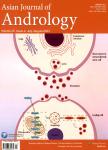Genetic effects on serum testosterone and sex hormone-binding globulin in men: a Korean twin and family study
Genetic effects on serum testosterone and sex hormone-binding globulin in men: a Korean twin and family study作者机构:Department of Epidemiology School of Public Health Seoul National University Seou1151-742 South Korea Institute of Health Environment Seoul National UniversitySeou1151-742 South Korea Department of Family Medicine Samsung Medical Center and Center for Clinical Research Samsung Biomedical Research InstituteSungkyunkwan University School of Medicine Seou1135-710 South Korea
出 版 物:《Asian Journal of Andrology》 (亚洲男性学杂志(英文版))
年 卷 期:2016年第18卷第5期
页 面:786-790页
核心收录:
学科分类:0710[理学-生物学] 071010[理学-生物化学与分子生物学] 081704[工学-应用化学] 07[理学] 0905[农学-畜牧学] 08[工学] 0817[工学-化学工程与技术] 09[农学]
基 金:supported by the Samsung Biomedical Research Institute Korea Health Technology R and D Project through the Korea Health Industry Development Institute
主 题:genetics Korean sex hormone-binding globulin testosterone twin study
摘 要:We conducted a community-based cross-sectional study to evaluate the role of genetics in determining the individual difference in total testosterone and sex hormone-binding globulin levels. Study participants comprised 730 Korean men consisting of 142 pairs of monozygotic twins, 191 pairs of siblings, and 259 father-offspring pairs from 270 families who participated in the Healthy Twin study. Serum concentration of total testosterone and sex hormone-binding globulin were measured by chemiluminescence immunoassay, and free testosterone and bioavailable testosterone were calculated using Vermeulen's method. Quantitative genetic analysis based on a variance decomposition model showed that the heritability of total testosterone, free testosterone, bioavailable testosterone, and sex hormone-binding globulin were 0.56, 0.45, 0.44, and 0.69, respectively after accounting for age and body mass index. Proportions of variance explained by age and body mass index varied across different traits, from 8% for total testosterone to 31% for sex hormone-binding globulin. Bivariate analysis showed a high degree of additive genetic correlation (p~ = 0.67) and a moderate degree of individual-specific environmental correlation (PE = 0.42) between total testosterone and sex hormone-binding globulin. The findings confirmed the important role of genetics in determining the individually different levels of testosterone and sex hormone-binding globulin during adulthood in Korean men as found in non-Asian populations, which may suggest that common biologic control for determining testosterone level directly or indirectly through binding protein are largely shared among different populations.



